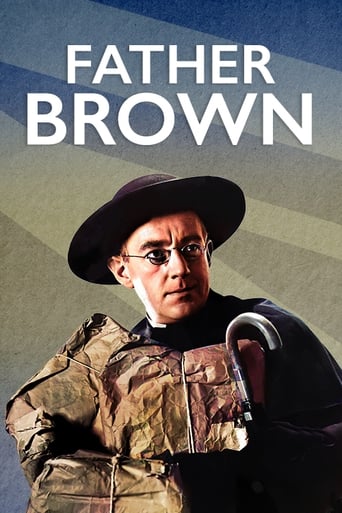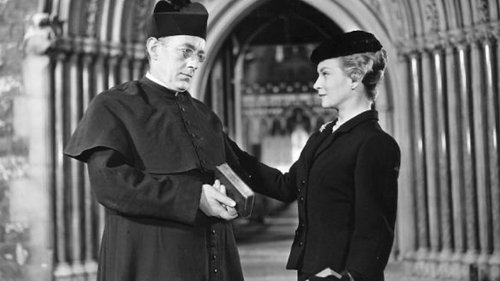JohnHowardReid
Music conducted by Muir Mathieson. RCA Sound Recording. Associate producer: Vivian Cox. Producer: Paul Finder Moss. Copyright 1 September 1954 by Facet Productions Ltd, London. Released through Columbia Pictures. New York opening at the Fine Arts: 1 November 1954. U.S. release: March 1955. London trade show: June 1954. Australian release: 9 June 1956 (sic). Sydney opening at the Lyceum. 8,200 feet. 91 minutes. Cut to 86 minutes in the U.S.A. (Until recently, this superb movie was only available on VHS, but Sony have now released a full 95 minutes version on DVD).U.S. release title: the DETECTIVE. U.K. release title: FATHER BROWN.SYNOPSIS: A master thief has his eyes on the priceless Cross of St Augustine carried by Father Brown on his way to Rome.COMMENT: A delight. True, the screenplay isn't quite as colorfully witty or chock-full of weird surprises as the original Chesterton pieces, (and the long arm of co-incidence in the story line strains — but by no means shatters — credulity in one or two places), but the writers make some pretty ingenious stabs in the right directions. Moreover, the direction is so deft and pacey, there's no time to ponder any trivial inconsistencies of plot or characterization. Plus the movie has been produced on a class "A" budget, with lots of extras milling around in plenty of fascinating sets and real-life locations.Aside from the polished screenplay, astute direction, sprightly music score and appealing visuals, the movie excels in its acting department. Alec Guinness makes a fine Father Brown, every inch as likable — and accurate — as Chesterton's creation, whilst Finch enjoys one of the best roles of his career as the masterful yet quirky misanthropic thief, Flambeau. Supporting honors lie in the hat-tossing hands of such stalwart character players as Bernard Lee, Sid James, Ernest Thesiger, Cecil Parker, John Salew, and Gerard Oury.Oddly, despite its credentials as one of the best British comedies of the year, plus box-office super-favorites Guinness and Finch in the leads, the movie was not successful in Australia. Perhaps the lack of a traditionally boring love interest swayed audiences to give the picture a miss. True, Joan Greenwood is co-starred, but her role is small and colorless.OTHER VIEWS: While the movie has not a great deal in common with Chesterton, does it really matter? On its own terms, the movie is mightily engaging. Not just for its performances, although these are no mean attractions. Guinness makes Brown so deliciously sly, full of almost mischievous humour, whilst Finch's equally appealing portrait of the suave, melancholy Flambeau, Joan Greenwood's charmingly mannered aristocratic parishioner, Sid James' fluent reformed thief, Cecil Parker's lordly bishop and Ernest Thesiger's fumbling master of heraldry, add greatly to the overall merriment. What makes Father Brown such an unalloyed delight is not just the story and the stars — appealingly attractive though they be — but Robert Hamer's stylish direction which — as Penelope Houston points out in her Monthly Film Bulletin review — has such a wonderfully detached, highly civilized air, "the more welcome because, in the British cinema, it is so uncommon."But what more could you expect of the director of Pink String and Sealing Wax, It Always Rains on Sunday, Kind Hearts and Coronets, and The Long Memory? JHR writing as George Addison.
tomsview
I remember seeing this film back in the 1960's on television, but it seemed to disappear for decades - from Australian television at any rate.Along with the delicious pairing of Alec Guinness as G.K. Chesterton's Father Brown and Peter Finch as master thief Flambeau, I always remembered the great photography shot on location in England and France, which gave the film a rich texture.This is such a complete movie. It has an interesting story; Father Brown immerses himself in the world of crime in order to save the souls of criminals. He matches wits with Flambeau who steals priceless works of art including a famous crucifix that the good father was guarding. The story builds to a brilliant climax in a village in France.The film is a joy to look at; Although it was not an Ealing film, it has that same sense of artistry as classics such as "The Lavender Hill Mob" and "The Ladykillers" with sumptuous interiors and classy black and white photography that was so distinctive of British films of the time.The film is a mystery and although it has an extremely light touch and witty lines, it's not really a comedy. There are also some nice pieces of detection as Father Brown tracks down Flambeau. Although the film is a brilliant two hander between Guinness and Finch it also has some perfect supporting roles, especially Joan Greenwood as Lady Warren.For soundtrack buffs, the film has a score by Georges Auric. However, although he came up with a fine theme for Father Brown, I think he may have been guilty of a little too much 'Mickey Mousing' in some scenes - it's my only criticism of the film, albeit a slight one.Recently (2015), Mark Williams starred in a very good series based on the "Father Brown" stories. Of course it's a series in the mould of "Miss Marple" and "Hercule Poirot". Anyone who feels crime movies need screeching tyres; shattered windscreens, arterial blood spray and Jason Stratham are probably not likely to pay too much attention to any manifestation of "Father Brown".However, the 1954 movie has that touch of indefinable movie magic. It also can't help but generate a feeling of nostalgia in people brought up in the 1950's when values and institutions seemed more straightforward - on the surface at least. It's a gem of a movie worth discovering and rediscovering.
lucy-19
It's odd that "gently comic" (as another reviewer put in) usually means "quite unfunny". Or rather, it means "we laugh at a harmless, good character". This film could have done with trying less hard to make us laugh. I can't stand seasickness jokes (tho I rather liked Flambeau's line when disguised as a priest "I must partake of the suffering of others"). And the bit where Brown and the librarian keep dropping/stepping on spectacles - I watched it stone-faced. Brown is quite bumbling enough without being "blind as a bat without my glasses" as well. The film opens well with Brown apparently robbing a safe (of course he's putting the money back). Sid James and Cecil Parker give sterling support, and the friendship between Brown and Lady Warren is touching, and I love the garage man who whisks the priest into the dance. This could have been a good film. Occasionally Guinness becomes entirely serious about saving Flambeau's soul and we glimpse what it might have been. It's based on the first Father Brown story in which Flambeau appears, and some of the plot is retained - the chase across town/country, the swapping of parcels, the wrestling holds, the man who's unmasked because he gives the wrong answer about... in the original story it's sin, not drive shafts. Read the story, it's one of the best (also read the one about the silver forks and the extra waiter). And it whisks you through a wild vision of Victorian London (Camden Town is as benighted as Darkest Africa, and they end up on Hampstead Heath - standing in for the high place where the Devil tempted Christ).
theowinthrop
Gilbert Keith Chesterton has never been ignored or forgotten since his death in 1936. Yet his contemporary, Rudyard Kipling, was as controversial as he was and is better remembered and read to this day. I am not sure if the reason is that Chesterton's twin attractions, his love of paradox (almost to a questionable mania) and his vigorous championing of Catholicism are the reasons for this. He is, in the latter aspect, a strong predecessor of Evelyn Waugh and Graham Greene, but both of those writers seem to have more of a readership today. But then they didn't adopt paradox.In his novel "Manalive" there is a moment when the appeal of his paradox reaches a point that is both understandable and questionable. The hero explains that the phrase "All that glitters is not gold" is false - all that glitters is gold. He starts pontificating on how many rarer elements (platinum?) exist that don't glitter as much, so that it is the attraction of the glitter of gold that makes it matter. One reads this discussion hoping that Chesterton is pulling our leg (a hope I still have, but it is very faint). The point of the phrase is that there are more valuable things in the universe than wealth producing items like gold - things like kindness, generosity, love. If Mr. C. was fooling us, I congratulate him on the still hit-on-the-head blow of the paradox. But if he meant it I really pity him.I leave it to his fans to explain it to me (if they wish). "The Detective" is one of the few movies based on Chesterton's huge output. It is based on the first story of his tales of the Roman Catholic priest and detective, Father Brown: "The Blue Cross". The story is a good one (the first of the first series of "Father Brown" tales), and introduces us to Flambeau, the master thief that Brown eventually saves. But for it to be done properly (not the way the movie quite does it) several of the stories have to be put together. The first three stories of the series deal with Brown, Flambeau, and the head of the Paris police. The last commits a murder in the second story, and commits suicide before Brown exposes him. So much for a guardian of the law. Flambeau is stopped by Brown reasoning with him that he is not a bad man but a man who is on the verge of becoming one if he lets an innocent man take the blame for a theft he committed. Flambeau does repent, and subsequently becomes a detective (and an assistant to Brown).This is a film which could have been reduced in length. Parts of the movie are quite amusing (the scene of Ernst Theisinger and Guiness breaking each other's eyeglasses is cute). The acting is also good (especially Guiness and Peter Finch as Flambeau). But the moments that move the viewer (and approach Chesterton's Catholicism) are when Guiness gives parables to explain behavior and human weakness. Witness his tale of the bad woman who fails to get pulled out of hell.I wish the film was not so dull in so many spots, but it is definitely worth a look.




